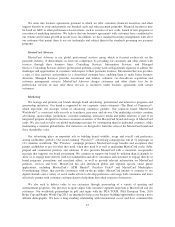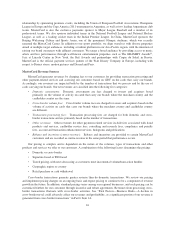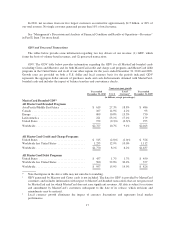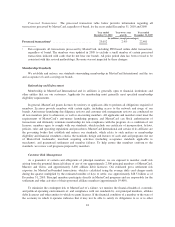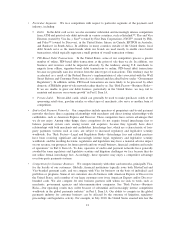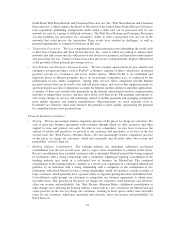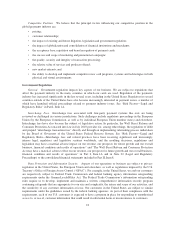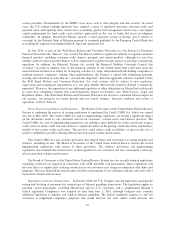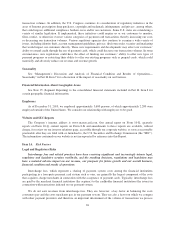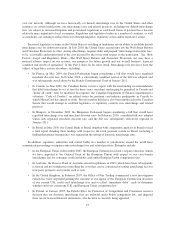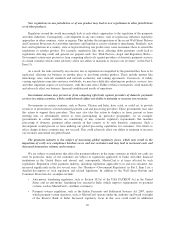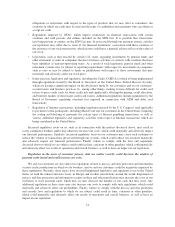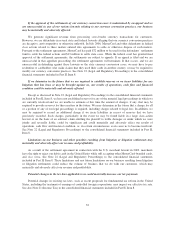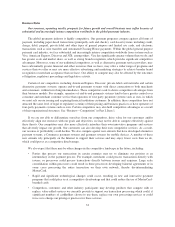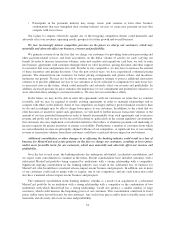MasterCard 2010 Annual Report Download - page 35
Download and view the complete annual report
Please find page 35 of the 2010 MasterCard annual report below. You can navigate through the pages in the report by either clicking on the pages listed below, or by using the keyword search tool below to find specific information within the annual report.service providers. Examinations by the FFIEC cover areas such as data integrity and data security. In recent
years, the U.S. federal banking regulators have adopted a series of regulatory measures affecting credit card
payment terms and requiring more conservative accounting, greater risk management and in some cases higher
capital requirements for bank credit card activities, particularly in the case of banks that focus on subprime
cardholders. In addition, MasterCard Europe operates a retail payment system in Europe and is subject to
oversight by the National Bank of Belgium pursuant to standards published by the European Central Bank that
are principally targeted at managing financial, legal and operations risk.
In July 2010, as part of the Wall Street Reform and Consumer Protection Act, the Bureau of Consumer
Financial Protection (the “Bureau”) was created. The Bureau will have significant authority to regulate consumer
financial products, including consumer credit, deposit, payment, and similar products, although it is not clear
whether and/or to what extent the Bureau will be authorized to regulate broader aspects of payment card network
operations. In addition, the Financial Reform Act created the Financial Stability Oversight Council (the
“Council”) in order to identify risks to the financial stability of the United States that could arise from the
material financial distress or failure of, or ongoing activities by, large, interconnected bank holding companies or
nonbank financial companies. Among other responsibilities, the Council is tasked with identifying payment,
clearing and settlement systems that are “systemically important” under the applicable statutory standard. Under
the Wall Street Reform and Consumer Protection Act, such systems will be subject to new regulation,
supervision and examination requirements. It is not clear whether MasterCard would be deemed “systemically
important.” However, the imposition of any additional regulatory or other obligations on MasterCard could result
in costly new compliance burdens that could negatively impact our business. See “Risk Factors—Legal and
Regulatory Risks—The Wall Street Reform and Consumer Protection Act may have a material adverse impact on
our revenue, our prospects for future growth and our overall business, financial condition and results of
operations” in Part I, Item 1A.
Issuer Practice Legislation and Regulation. The Board of Governors of the United States Federal Reserve
System is continuing the process of issuing regulations to implement the Credit CARD Act, which was signed
into law in May 2009. The Credit CARD Act, and its implementing regulations, are having a significant impact
on the disclosures made by our customers and on our customers’ account terms and business practices. The
Credit CARD Act, and its implementing regulations, are making it more difficult for credit card issuers to price
credit cards for future credit risk and will have a significant effect on the pricing, credit allocation, and business
models of most major credit card issuers. The new law could reduce credit availability, or increase the cost of
credit to cardholders, possibly affecting MasterCard transaction volume and revenues.
The Credit CARD Act also includes provisions that impose limits and restrictions on certain prepaid card
products, including on fees. The Board of Governors of the United States Federal Reserve System has issued
implementing regulations with respect to these provisions. The statutory provisions and implementing
regulations may diminish the attractiveness of these products to our customers and may consequently adversely
affect transaction volumes and revenues.
The Board of Governors of the United States Federal Reserve System has also recently adopted regulations
regulating overdraft fees imposed in connection with ATM and debit card transactions. These regulations will
have the effect of significantly reducing overdraft fees our customers may charge in connection with debit card
programs. This may diminish the attractiveness of debit card programs to our customers and may adversely affect
transaction volumes and revenues.
Regulation of Internet Transactions. In October 2006, the U.S. Congress enacted legislation requiring the
coding and blocking of payments for certain types of Internet gambling transactions. The legislation applies to
payment system participants, including MasterCard and our U.S. customers, and is implemented through a
federal regulation. Compliance was required no later than June 1, 2010, although Congress may consider
additional legislation to legalize and regulate Internet gambling. The federal regulation requires us and our
customers to implement compliance programs that would increase our costs and/or could decrease our
25


